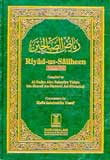Riyad Us-Saliheen (Gardens of the Righteous)

Chapter 131
Excellence of Promoting Greetings
Allah, the Exalted, says:
"O you who believe! Enter not houses other than your own, until you have asked permission and greeted those in them.'' (24:27)
"But when you enter the houses, greet one another with a greeting from Allah (i.e., say: As-Salamu `alaikum - peace be on you), blessed and good.'' (24:61)
"When you are greeted with a greeting, greet in return with what is better than it, or (at least) return it equally.'' (4:86)
"Has the story reached you, of the honoured guests [three angels; Jibril (Gabriel) along with another two] of Ibrahim (Abraham)? When they came in to him, and said, `Salam (peace be upon you)!' He answered: `Salam (peace be upon you).''' (51:24,25)
845. Abdullah bin `Amr bin Al-`as (May Allah be pleased with them) reported: A man asked the Messenger of Allah (PBUH): "Which act in Islam is the best?'' He (PBUH) replied, "To give food, and to greet everyone, whether you know or you do not.''
[Al-Bukhari and Muslim].
Commentary: Feeding poor and destitute is an act of goodness, and so is fulfilling the needs of the indigent. Greeting everybody (saying `As-Salamu `Alaikum'), whether an acquaintance or a stranger, is a good manner too. Both of these acts generate mutual love and remove hatred and ill will from hearts. All other forms of greetings do not no substitute for Islamic greeting.
846. Abu Hurairah (May Allah be pleased with him) reported: The Prophet (PBUH) said, "When Allah created Adam (PBUH), He said to him: `Go and greet that company of angels who are sitting there - and then listen to what they are going to say in reply to your greetings because that will be your greeting and your off-spring's.' Adam (PBUH) said to the angels: `As-Salamu `Alaikum (may you be safe from evil).' They replied: `As-Salamu `Alaikum wa Rahmatullah (may you be safe from evil, and Mercy of Allah be upon you).' Thus adding in reply to him: `wa Rahmatullah (and Mercy of Allah)' to his greeting.''
[Al-Bukhari and Muslim].
Commentary: The Islamic form of greeting - As-Salamu `Alaikum (may you be safe from evil) - has been in existence since the days of Prophet Adam. According to some Ahadith, it is better to add in response: wa Rahmatullahi wa Barakatuhu (and the Mercy and Blessings of Allah).
847. Al-Bara' bin `Azib (May Allah be pleased with them) reported: The Messenger of Allah (PBUH) commanded us to do seven things: to visit the sick, to follow the funeral (of a dead believer), to invoke the Mercy of Allah upon one who sneezes (i.e., by saying to him: Yarhamuk-Allah), to support the weak, to help the oppressed, to promote the greeting of `As-Salamu `Alaikum', and to help those who swear to do something to keep their oaths.
[Al-Bukhari and Muslim].
Commentary: Muslims have obligations towards one another. The fulfillment of this social responsibility creates among them mutual love, a sense of cohesion and feelings of respect for one another.
848. Abu Hurairah (May Allah be pleased with him) reported: The Messenger of Allah (PBUH) said, "By Him in Whose Hand is my life! You will not enter Jannah until you believe, and you will not believe until you love one another. Shall I inform you of something which, if you do, you will love one another? Promote greetings amongst yourselves.''
[Muslim].
Commentary: Iman is a prerequisite for entry to Jannah. Whereas mutual love among Muslims is complementary to it, and this quality can only be attained by giving a social character to the Islamic form of greeting, that is to say, `As-Salamu `Alaikum.'
849. `Abdullah bin Salam (May Allah be pleased with him) reported: I heard the Messenger of Allah (PBUH) saying, "O people, exchange greetings of peace (i.e., say: As-Salamu `Alaikum to one another), feed people, strengthen the ties of kinship, and be in prayer when others are asleep, you will enter Jannah in peace.''
[At-Tirmidhi].
Commentary: All these habits and practices are indispensable to a believer because each one of them leads to Jannah with the first people to enter it without being punished in Hell first.
850. At-Tufail bin Ubayy bin Ka`b (May Allah be pleased with him) reported: I used to visit `Abdullah bin `Umar (May Allah be pleased with them) in the morning and accompany him to the market. `Abdullah offered greetings of peace to every one he met on the way, be they sellers of petty goods, traders or poor people. One day when I came to him, he asked me to accompany him to the market. I said to him: "What is the point of your going to the market when you do not sell, nor ask about articles, nor offer a price for them, nor sit down with any company of people. Let us sit down here and talk.'' He replied: "O Abu Batn (belly)! (Tufail had a large belly), we go to the market to greet everyone we meet.''
[Malik].
Commentary: This Hadith highlights `Abdullah bin `Umar's passion for promoting Salam which is a practice of Sunnah. Secondly, we can call a person by his epithetic name provided he is not offended by it.
